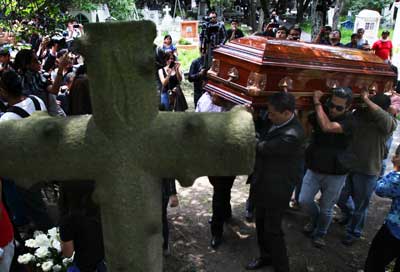EDITOR’S NOTE: This article was originally published, in Spanish, on Univision.com.
The state of Veracruz has become one of the world’s most lethal regions for the press. According to research by the Committee to Protect Journalists, when you include the case of Anabel Flores Salazar, whose body was found on Tuesday, at least 12 journalists have been murdered in Veracruz since Javier Duarte de Ochoa become governor in 2010. Three more have disappeared, their whereabouts unknown. Other free expression groups, using different criteria, have documented higher numbers.
Veracruz has long been a weigh station on drug-smuggling routes through Mexico, and so it would be unfair to hold Duarte solely responsible for the high levels of violence in the state. However, the governor is responsible for the failure to achieve justice in any of these cases and the terrible environment in which journalists must work.
The governor is unquestionably a polemical figure. During his administration, he has been seriously questioned by various sectors. Allegations of corruption weigh on his administration, along with alleged ties to organized crime. Duarte has energetically and repeatedly denied all of these accusations. Nevertheless, for the sake of the people of Veracruz, journalists must be able to cover these issues without fearing for their lives. In fact, this is one of the central roles of the press: to hold public officials accountable for their actions.
Unfortunately, fear has made it impossible for journalists in Veracruz to do their jobs. In one highly publicized case, photographer Rubén Espinosa fled the state for Mexico City last July after receiving death threats. The photojournalist turned up dead along with four women in a Mexico City apartment. Espinosa covered social movements, especially student protests, for AVC Noticias, the newsweekly Proceso, and the photo agency Cuartooscuro.
Espinosa’s fear was justified. Gov. Duarte has a deplorable record when it comes to investigating crimes against journalists. The majority of the cases have never been resolved. The murderers of journalists walk freely through the streets of the state. In the few instances in which there have been prosecutions–such as for the murder of Regina Martínez, who was a correspondent for Proceso–there have been denunciations of irregularities in the judicial process, including the use of scapegoats to obscure the investigation.
One of the features that distinguishes the government of Veracruz is its tendency to minimize any relationship between the murders and the journalistic work of the victims. Worse, the governor and his associates stubbornly accuse journalists of collaborating with criminal groups, citing unverified, circumstantial evidence. This is viewed with great concern, and many believe that it is done with the clear intention of obstructing justice.
The case of Anabel Flores Salazar is the most recent. A press release from the Veracruz state prosecutor distributed soon after she was abducted on Monday asserted that in August 2014 the journalist had been seen with an alleged member of a criminal group, who was arrested. The authorities announced they were analyzing a possible connection between Flores Salazar and this individual.
Veracruz is a land of impunity. In 2012, more than a year after Duarte took power, Mike O’Connor, who was then CPJ’s correspondent in Mexico, traveled to Veracruz and wrote the following: “Veracruz is a beautiful, long, thin state on the Gulf coast of Mexico where many journalists are terrified not only of the rampant organized crime groups that kill and control, but also of the state government. Fear that state officials will order them murdered for what they investigate or write has forced about a dozen journalists to flee the state, claiming that fear also puts a clamp on coverage for those who remain.”
Nothing has changed. In a country with a democratic system and credible institutions, this record would at a minimum spark a political backlash for officials’ failure to fulfill the responsibilities of public office. Nothing of the kind has occurred in Veracruz, where Duarte continues to enjoy impunity and remains isolated from the deluge of criticism of his office.
At this point it is clear that all of these questions about Gov. Duarte have become one of the greatest obstacles to the delivery of justice in the state. With a bit of common sense and dignity, considering that he has lost legitimacy as the representative of the people of Veracruz, Duarte should resign in order to guarantee an orderly transfer of power before next June’s elections. Such a decision would open, perhaps, the possibility of bringing justice the slain journalists of Veracruz.
